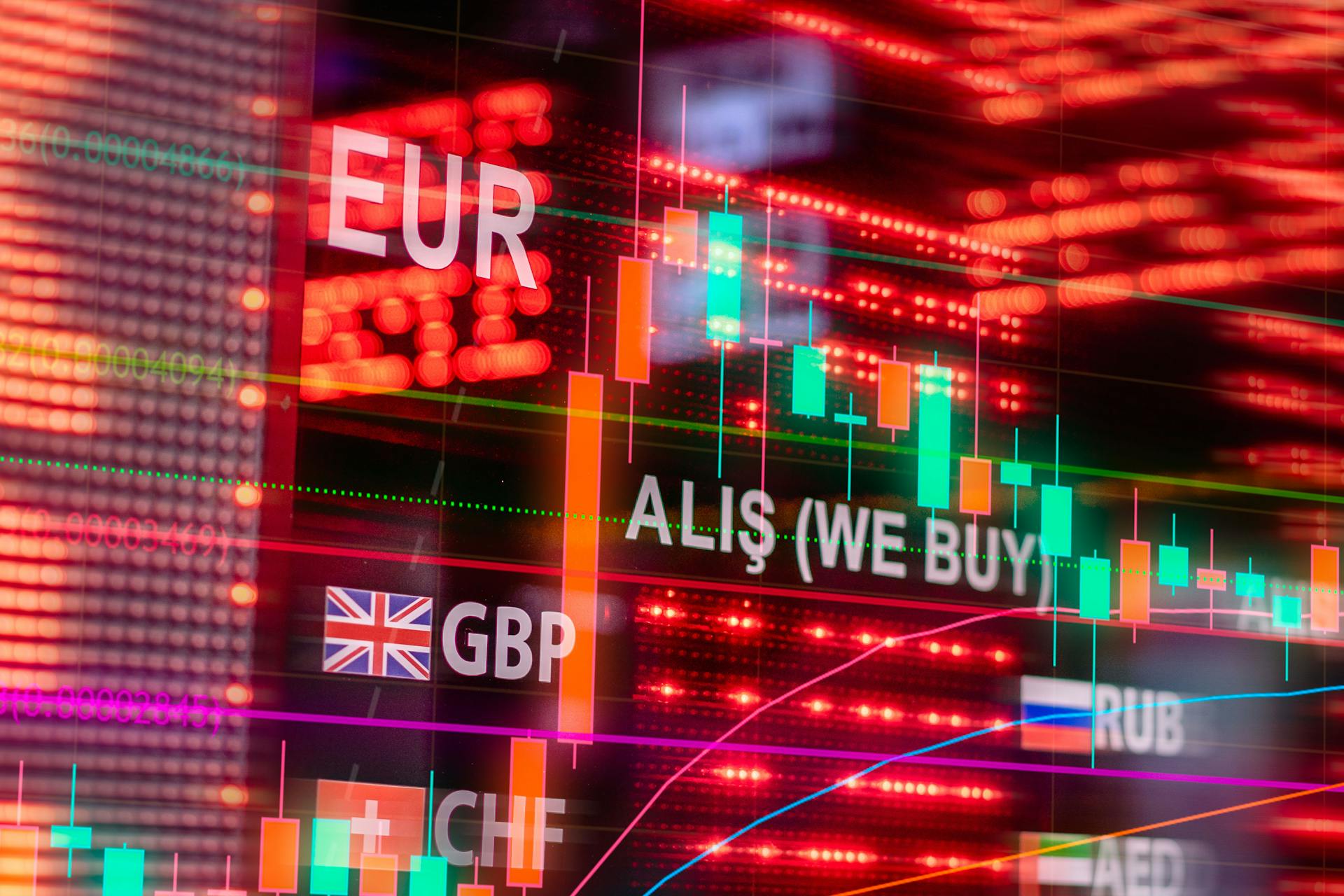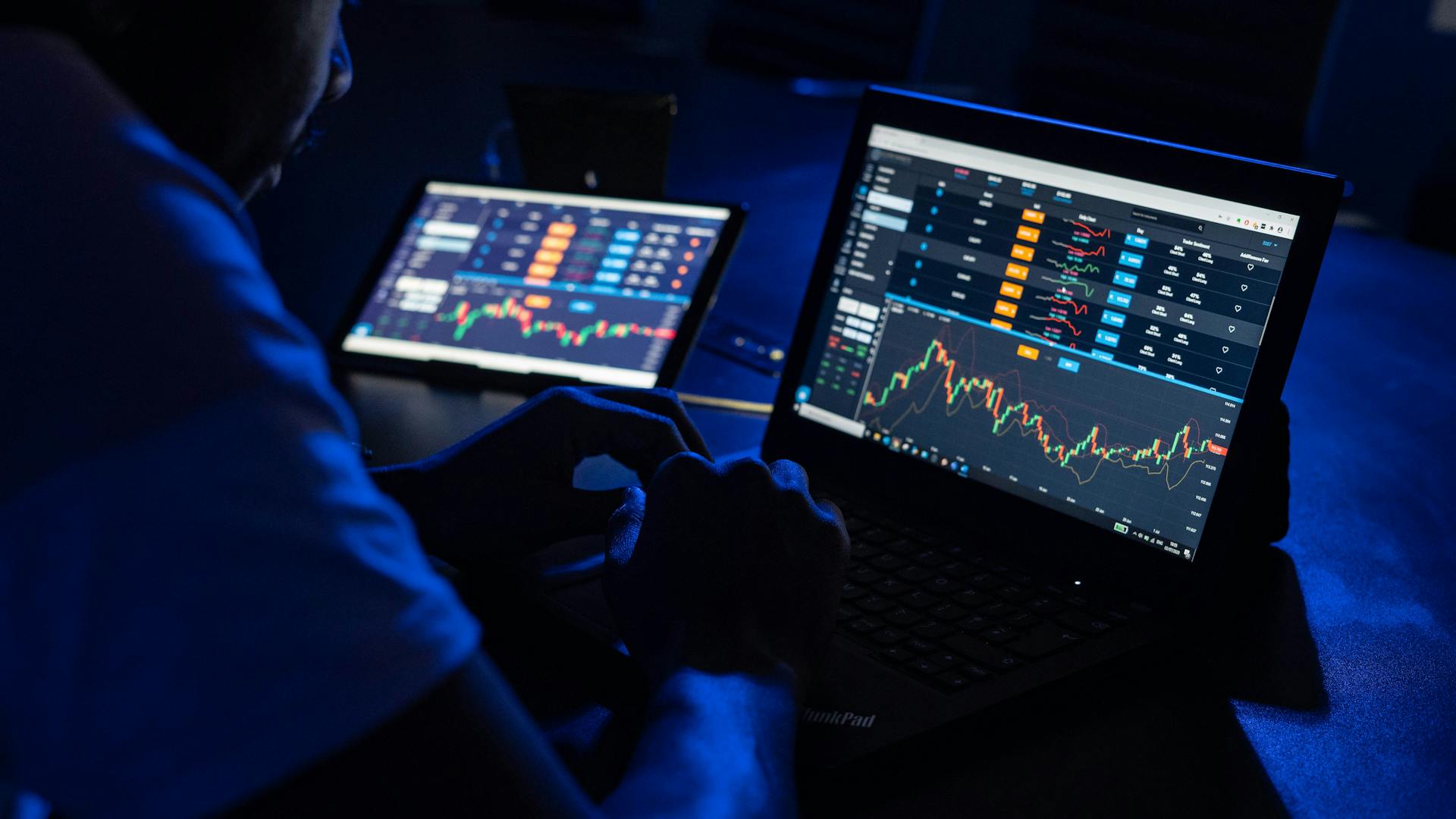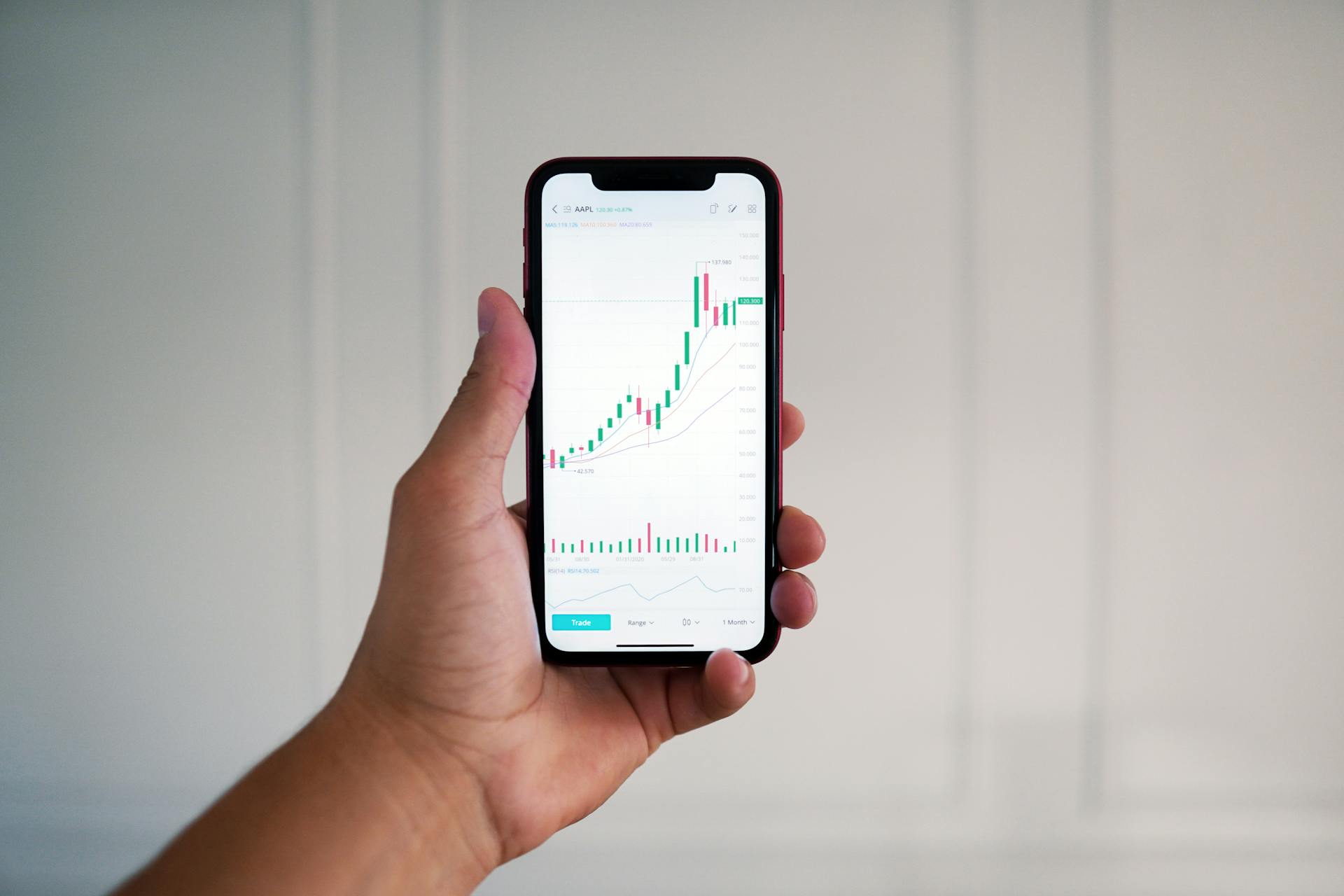
Forex trading psychology is a crucial aspect of successful trading, and it's not just about having a good strategy - it's about managing your emotions and mindset to make informed decisions.
Developing a pre-trade routine can help you get into a focused state of mind, such as taking a few deep breaths or doing a quick exercise routine, as discussed in the article section on "Creating a Pre-Trade Routine".
Having a clear trading plan is essential to avoid impulsive decisions, and this can be achieved by setting specific goals and risk management strategies, as outlined in the section on "Setting Trading Goals and Risk Management".
Staying disciplined and avoiding emotional trading is key to long-term success, and this can be achieved by tracking your performance and making adjustments as needed, as discussed in the section on "Tracking Performance and Adjusting Your Strategy".
Emotional Control
Emotional control is crucial in forex trading, as it allows you to make rational decisions despite market turbulence. Fear, greed, excitement, and frustration can all impact your ability to make rational decisions.
Emotions can intensify in the fast-paced and volatile forex market, triggering anxiety and boredom. Recognizing these triggers is crucial for mitigating their impact.
Improving emotional control in forex trading involves developing self-awareness and practicing techniques to manage stress and emotions. This can be achieved through journaling, meditation and mindfulness, visualization, and taking regular breaks during trading.
Emotional stability means maintaining composure amid market turbulence and not getting carried away by winning streaks. Successful traders understand that emotions such as fear and greed can lead to irrational trading decisions and use strategies to manage them.
Here are some strategies to improve emotional control in forex trading:
- Journaling: Keep a detailed trading journal to track your trades and emotional responses.
- Meditation and Mindfulness: Practice meditation and mindfulness to enhance focus and reduce stress.
- Visualization: Use visualization techniques to envision successful trades and positive outcomes.
- Regular Breaks: Take regular breaks during trading to avoid emotional fatigue.
Mastering trading psychology in forex isn't about eliminating emotions but managing them effectively. Successful forex traders exhibit emotional stability and unwavering discipline.
Managing Risk
Managing risk is crucial in forex trading, and it starts with setting stop-losses to limit potential losses. This helps protect your capital and reduce stress.
Effective risk management involves understanding that trading involves risk and having a risk management plan in place. Successful traders use stop-loss orders and position sizing to limit their losses and protect their capital.
Emotions like fear and greed can lead to irrational trading decisions, so it's essential to keep your emotions in check. Emotional control is the ability to manage emotions and not let them interfere with trading decisions.
Proper position sizing is also vital to avoid taking trades that are too large for you. Without it, you may end up losing your entire account.
To manage risk, consider using techniques like diversifying trades, limiting position sizes, and setting stop-losses. These strategies can help mitigate emotional reactions to losses and protect your capital.
Recommended read: Trade Working Capital
Discipline and Routine
Discipline is key to sticking to your trading plan and avoiding impulsive decisions. It's essential to set clear rules for each trade and adhere to them, regardless of market conditions or emotional impulses.
Establishing a daily trading routine fosters focus and consistency. This routine should include analysis, trade planning, and performance review. Discipline ensures adherence to the trading plan, reducing emotional decision-making.
Regularly revising the plan prepares traders for market shifts. It's crucial to have a set of rules that guide your decision-making process and follow them consistently. By exercising discipline, traders can avoid overtrading and make more informed decisions.
Patience is a key ingredient for success in forex trading, allowing traders to remain calm and focused even in volatile market conditions. Focused traders remain disciplined and patient and avoid making impulsive decisions.
A well-structured trading plan acts as a roadmap, guiding your decisions and reducing emotional influence. Your plan should include entry and exit strategies, risk management rules, and specific trading goals.
Discipline is essential for adhering to your trading plan and avoiding impulsive actions driven by emotions. Stick to your strategies, even when faced with setbacks or market volatility. Effective risk management is crucial for protecting your capital and limiting potential losses.
By developing a resilient mindset, traders can quickly recover from losses and setbacks. Successful traders learn from losses, foster a positive mindset, and control emotions through methods like trade journaling.
Take a look at this: Currency Trading Strategy
Mindfulness and Relaxation
Mindfulness and relaxation techniques are essential for staying calm and focused while trading. Meditation and deep breathing exercises can help reduce stress and improve emotional regulation, which in turn enhances decision-making ability.
Daily mindfulness practice can help you stay calm under pressure. By incorporating mindfulness into your daily routine, you can better manage stress and make more rational decisions.
To practice mindfulness, try setting aside a few minutes each day for meditation or deep breathing exercises. Even a short daily practice can make a big difference in how you approach trading.
Daily Visualization Sessions can help you prepare for different trading scenarios. Spend a few minutes each day visualizing successful trades and emotional control.
You can also use Positive Affirmations to boost confidence and reinforce a positive mindset. Repeat affirmations to yourself, such as "I am confident in my trading decisions" or "I can handle market volatility."
Take a look at this: How to Practice Trading Stocks
Journaling
Keeping a trading journal is essential for forex traders. It helps you reflect on your trades, identify emotional triggers, and learn from past mistakes.
Documenting your trades allows you to track patterns in your behaviour and make adjustments. This can help you refine your strategies and improve your decision-making process.
A trading journal can help you recognize patterns in your behaviour and make adjustments. By tracking your trades, you can analyze your performance and identify emotional patterns.
Used properly, a trading journal can help you track your behavioral tendencies and their usual outcomes. This can be a valuable tool for improving your forex trading skills.
Hours in chart time and deliberate practice aren't enough to guarantee positive results. To make progress, you need to ensure your practice leads to progress, and a trading journal can help with that.
Find a Supportive Community
Finding a supportive community is one of the most valuable resources you can tap into as a forex trader. Engaging with like-minded individuals can provide immense benefits, including shared knowledge, emotional support, and networking opportunities.
Being part of a community allows you to share experiences and learn from the successes and mistakes of others. This can help you refine your approach and identify areas for improvement.
Online forums, social media groups, and local trading clubs are great places to connect with others who understand the challenges of forex trading. I've found that joining a community has helped me stay motivated and accountable during tough trading periods.
Here are some benefits of being part of a trading community:
- Shared Knowledge: Access to diverse perspectives and strategies.
- Emotional Support: Encouragement and support during tough trading periods.
- Networking Opportunities: Connections that could lead to mentorship and collaboration.
Biases and Cognitive Errors
Forex trading psychology is a complex and multifaceted field that involves understanding the emotional and cognitive biases that can affect our decision-making. Traders generally face two categories of behavioral biases: cognitive biases and emotional biases.
Cognitive biases are patterns of errors or blind spots in thinking that are common to human beings, resulting from subconscious mental processes. These may include overconfidence bias, mental accounting, and anchoring bias, among other examples.
Emotional biases are deviations from rationality arising from feelings, moods, perceptions, or beliefs. These include herding behavior, loss aversion bias, and the emotional impacts of fear and greed, among others.
To overcome biases, traders can employ many strategies, such as improving education of behavioral finance principles, developing and sticking to a trading plan, and performing their own objective fundamental or technical analysis research.
Some common cognitive biases that can affect trade decisions include overconfidence bias, anchoring bias, and confirmation bias. Overconfidence bias occurs when traders overestimate their abilities and the accuracy of their predictions.
Anchoring bias involves overly relying on initial information, such as a price level or forecast, without adapting to new data. Confirmation bias leads traders to seek information that confirms their existing beliefs while disregarding contradictory evidence.
Loss aversion bias causes traders to fear losses more than they value equivalent gains, often leading to holding losing positions too long. Implementing and sticking to strict stop-loss orders can help traders accept and manage small losses.
Traders should regularly review their performance, seek feedback, and remain humble, acknowledging that the market is unpredictable and that losses are part of the trading journey.
Never Stop Learning
Continuous education is key to building confidence and reducing the impact of emotions in forex trading. By staying updated with market news and learning from experienced traders, you can enhance your trading performance and achieve long-term success.
Mastering your emotions is crucial for successful forex trading, and it's as much a psychological game as it is a technical one. Embracing the journey of mastering your emotions can significantly improve your trading skills.
Staying informed about market trends, technical analysis, and risk management techniques is essential for managing emotions and making informed decisions. This requires continuous learning and research.
Successful traders are always looking for ways to improve their strategy and stay ahead of the curve. They keep an eye on economic and political developments that could impact currency prices.
Traders should be open to learning new things and expanding their knowledge and skills, which can involve taking courses, attending webinars, or reading books and articles. This will help them stay up to date with the latest market trends and news.
Every trader makes mistakes, but successful traders are those who learn from their mistakes and use them to improve their future performance. This requires a willingness to reflect on past trades and identify areas for improvement.
Check this out: How to Trade in Equity Market
Goal Setting and Mindset
Setting specific, measurable, achievable, relevant, and time-bound (SMART) goals is crucial for traders to stay focused and motivated. By setting SMART goals, traders can track their progress over time and adjust their trading strategy accordingly.
Traders should set specific goals that are clear and well-defined, such as increasing profits by a certain percentage or maintaining a certain level of risk management in every trade. Measurable goals are also essential, as they allow traders to track their progress over time.
Developing a resilient mindset is key in forex trading psychology, as it involves quickly recovering from losses and setbacks. Successful traders learn from losses, foster a positive mindset, and control emotions through methods like trade journaling.
A well-structured trading plan acts as a roadmap, guiding your decisions and reducing emotional influence. Your plan should include entry and exit strategies, risk management rules, and specific trading goals.
Traders should assess their skills and resources and set goals that are challenging but attainable. Setting unrealistic goals can lead to frustration and disappointment.
Performance and Progress
To make progress in your forex trading, it's not just about putting in the hours or deliberate practice. You need to focus on process, not profits, and concentrate on following your trading plan and making sound decisions.
Discipline is key to sticking to your trading plan and avoiding impulsive decisions. Set clear rules for each trade and adhere to them, regardless of market conditions or emotional impulses.
Hours in chart time and deliberate practice aren’t enough to guarantee positive results. You need to take time to deliberate, but when the time for action has arrived, stop thinking and go in.
A trading journal can help you track your behavioral tendencies and their usual outcomes. Use it properly to make the most out of it.
Deliberate practice is a process applied by pros in several performance fields, be it sports or music. Apply it to improve your trading by focusing on the three stages of deliberate practice.
To review your trading performance, take time to reevaluate your mistakes and losses. Embrace your weaknesses so that you can learn from them.
Take a look at this: Stocks Overnight Trading
When Things Aren't Going Your Way, Persevere
Forex trading can be a rollercoaster of emotions, but it's essential to stay focused on your goals.
Perseverance is key to overcoming setbacks, which are a normal part of the journey. Successful forex traders understand that trading is not easy, and setbacks are part of the journey.
Fear, greed, overconfidence, impatience, and loss aversion are common psychological challenges faced by forex traders. These emotions can cloud judgment and lead to impulsive decisions.
Developing and sticking to a trading plan with trading rules and risk management practices can provide a structured approach to investing. This can minimize room for emotional decision making and help traders avoid pitfalls.
Trading excessively while underestimating investment risk and failing to adequately diversify investments can lead to significant losses. Emotional responses to feelings of fear or greed may lead to impulsive decision-making during periods of market volatility.
Perseverance helps traders stay committed to their goals and remain focused on their long-term success. It's essential to understand that setbacks are a normal part of the journey and that every successful trader has experienced them.
Investors and traders are prone to behavioral biases and can encounter multiple pitfalls, including selling winning investments quickly while holding on to losing investments for too long. Understanding the concepts of trading psychology can assist in making more informed and rational decisions.
General Tips and Strategies
Developing a well-defined trading plan is crucial for effective forex trading psychology. A trading plan should outline clear entry and exit strategies, risk management parameters, and position sizing.
Stick to your plan and adjust it based on objective analysis, not emotional reactions. Regularly review and refine your plan to adapt to market changes and enhance your experience.
Continuous learning reduces uncertainty and helps manage emotions. Engage in webinars, read extensively, and participate in trading communities to stay updated and improve your skills.
Effective bankroll management is key to financial stability and reducing emotional attachment to trades. Allocate a specific portion of your capital to forex trading and adhere to it strictly.
Here are some key strategies to manage your bankroll wisely:
Implementing stop-loss and take-profit orders can help limit losses and secure profits objectively. Set these orders based on your trading plan to maintain discipline and avoid emotional decision-making.
Developing self-awareness through techniques like trade journaling and meditation can help you practice emotional control. Journaling tracks emotional responses and identifies patterns, while meditation enhances focus and reduces stress.
Common Pitfalls and Biases
Forex trading is a challenging field that requires a combination of technical knowledge and emotional control. Traders generally face two categories of behavioral biases: cognitive biases and emotional biases.
Cognitive biases are patterns of errors or blind spots in thinking that are common to human beings, resulting from subconscious mental processes. Overconfidence bias is an example of a cognitive bias that can lead traders to make irrational choices.
Emotional biases are deviations from rationality arising from feelings, moods, perceptions, or beliefs. Herding behavior is a common emotional bias in which traders follow the crowd in chasing recent top-performing assets.
Investors and traders are prone to behavioral biases and can encounter multiple pitfalls, such as selling winning investments quickly while holding on to losing investments for too long. Traders may also act impulsively on information received, based on their perceived superior investing abilities.
Emotional responses to feelings of fear or greed may lead to impulsive decision-making during periods of market volatility. Understanding the concepts of trading psychology can assist in making more informed and rational decisions.
Traders can employ many strategies to overcome biases, such as improving education of behavioral finance principles and developing and sticking to a trading plan. Performing objective fundamental or technical analysis research on investment opportunities can also assist in avoiding herd-following behavior.
Forex traders often face a range of psychological challenges, including fear, greed, overconfidence, impatience, and loss aversion. These emotions can cloud judgment and lead to impulsive decisions.
It is said more than 95% of aspiring forex traders are expected to drop out of the game within their first few years due to common pitfalls and biases.
Frequently Asked Questions
What is physiology in forex trading?
Forex trading psychology refers to the mental states and emotions that influence trading decisions, often leading to impulsive choices and biased thinking. Understanding trading psychology is crucial for disciplined and informed decision-making in the foreign exchange market.
Sources
- https://www.wealthwithin.com.au/learning-centre/leveraged-trading/the-psychology-of-forex-trading-mastering-your-emotions
- https://blog.opofinance.com/en/trading-psychology-in-forex-mastering-emotions-for-success/
- https://fatdaytrader.com/blog/trading-psychology-the-importance-of-mindset-in-forex-trading
- https://www.investopedia.com/terms/t/trading-psychology.asp
- https://www.babypips.com/trading/psychology
Featured Images: pexels.com


